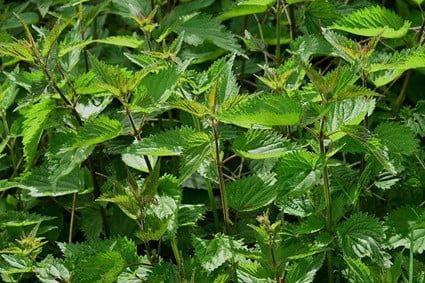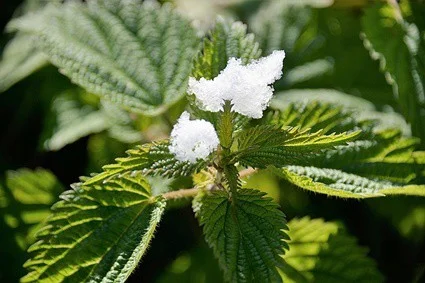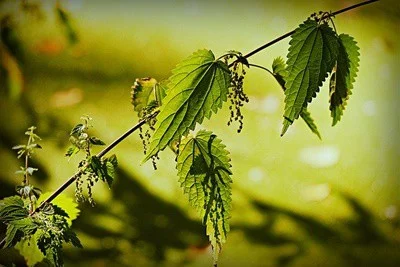Stinging nettles are a common weed in the U.S., and many rabbit owners question if their rabbits can eat nettle leaves. It seems a waste to throw out any clippings from a de-weeding effort. Thankfully, rabbits can eat stinging nettle leaves. Don’t fret if your rabbit nibbled on stinging nettles in the back yard either. Surprisingly, it will actually benefit from doing so.
Rabbits can eat stinging nettles in various forms, including fresh and dried. Rabbits appear to be immune to the sting of the nettle. This makes them safe for rabbits to eat without being cooked to neutralize the venom and stingers. A rabbit can eat a stinging nettle from the yard, so long as it has been washed and was not exposed to chemicals, pesticides, car fumes, or animal waste. You can also offer a rabbit blanched stinging nettle leaves, dried leaves, or a stinging nettle tea.
Feeding your rabbit stinging nettles can benefit its nutritional intake and health. Nettles are full of vitamins, minerals, and essential acids. All of these work together to fight free radicals, and can help reduce inflammation, blood sugar levels, and blood pressure. You can safely feed rabbits a handful of fresh stinging nettles 1-2 times a week as a part of their diet.
Is It Safe for Rabbits To Eat Nettles?
There are many plants, herbs, and even weeds that rabbits can and will eat. Thankfully, common stinging nettles are amongst a group of weeds that rabbits can safely eat. This is a boon to many rabbit owners.
As noted by the Journal of Environmental Science and Health, stinging nettles are commonly found in the cooler parts of the U.S., especially in areas that see frequent rainfall.
Stinging nettles belong to the Urticaceae family, which includes a number of nettles asides from the most commonly known stinging nettle (Urtica dioica). We mostly consider this plant a weed, despite it being used frequently in foods and medicines. The Journal of Herbal Medicine even states that stinging nettles are a staple among Western herbalists.
Wild stinging nettles that you prune from your yard shouldn’t be used in your kitchen unless you know how to harvest them. You can, however, safely feed the weed to your rabbit without prep.
Rabbits don’t seem to be affected by the stinging nettle’s bite. That’s quite the evolutionary advantage, considering the abundance of the weed. Humans and other animals can’t safely handle or consume stinging nettles prior to being prepared. Rabbits, on the other hand, can consume a nettle plant without any issues.

Are Rabbits Allowed Stinging Nettles?
Rabbit owners are encouraged to include fresh greens in a rabbit’s diet. Not only does this provide a varied diet, but a diet full of fresh nutrients, vitamins, and minerals.
Of course, you should only feed your rabbit healthy stinging nettles, free of fungi, parasites, and any chemicals. If you remove any nettle weeds from your yard, be sure to check them over for any such impurities. Clean them in water, too, before feeding any to your rabbit.
Nettles can very easily be cultivated, if you want to grow your own crops specifically for your rabbit. Just be sure to keep them contained. They are classified as a weed for a reason.
Do Rabbits Eat Nettles?
In the wild, rabbits will eat a wide variety of grasses, herbs, and weeds. This includes nettles, which can be found in many locations all over the world that wild rabbits naturally live in.
At this point in time, we aren’t certain if rabbits evolved an immunity to the nettle’s bite. The immunity may also be happenstance or a product of luck.
A domestic rabbit will happily munch on any nettles that it finds in your yard. This also applies to any other plants it comes across. For this reason, if your rabbit is allowed to roam in outside areas, be sure those spots only contain safe plants. The plants themselves should be safe for rabbits, and should not be treated by substances toxic to rabbits.
Can Rabbits Eat Nettle Leaves?
The venom-filled hair-like structures of the stinging nettle can be found on the stem of the plant and the leaves. These are the needles that deliver venom on contact, causing the stinging, burning sensation many are familiar with. The needles differ little between those found on the leaves and the stem. Rabbits can eat both parts of the plant with equal ease. Rabbits can also eat the flowers of the stinging nettle.
The leaves are what your rabbit will nibble on first. You can pick a handful of leaves off the main plant and feed these to your rabbit. This allows you to preserve the plant for further harvesting once the leaves grow back.
Feeding Rabbits Nettles
Now that we know rabbits can eat stinging nettles, let’s discuss how to include nettles in a rabbit’s diet. There are a number of ways that you can offer your rabbit nettles.
Dried Nettle For Rabbits
Rabbits can safely consume stinging nettles when they’re dried. Native Plants Journal states that nettle is safe for human consumption once it has been cooked or dried.
You can usually find pre-prepared nettle in both health food stores and pet supply stores. We would recommend sourcing pet-specific dried nettle or carefully reading the ingredients on any human foods for additives. You can also dry nettle yourself. There are two ways to do this:
- You can hang the nettle upside down in a cool, dry place. Depending on your climate, it should be left for several days or a few weeks. The weed will naturally dry.
- If you live in humid or wet locations, pop the leaves into a food dehydrator. Wash the harvested nettle in water and allow it to dry before beginning the dehydration process.
Once the nettle has been dried out, you can crush it up and mix it through your rabbit’s food. You can also store it in an air-tight container long-term.
Fresh Nettle for Rabbits
Rabbits can eat nettle fresh from the yard. After washing the nettle, you can offer your pet a handful as a treat or alongside its usual food.
A rabbit should have around a handful of fresh vegetables and greens a day. Nettles are one of the plants that can be a regular inclusion in the rabbit’s diet, alongside other greens. If you are worried about the needles, you can crush them with the flat part of a knife.
Cooked Nettle for Rabbits
Nettle can be cooked in a number of ways. Keep in mind that nettle does not have to be cooked for a rabbit to be able to eat it. The cooking process breaks down the needles and venom, rendering the nettle harmless for human consumption.
The only way that nettle should be cooked for rabbits is via blanching. Blanching is when you submerge the nettle clippings in boiling water.
- For rabbits, blanch the leaves for anywhere between 30 seconds and 5 minutes. The longer you cook the nettle, the higher the risk that it will turn into mush, though.
- Once cooked, remove the nettle from the boiling water and dump it straight into an ice bath. This shocks the nettle and immediately stops the cooking process.
- Post-blanching and cooling, you can feed the rabbit the leaves.
- You can also freeze the leaves and defrost them as needed. This makes them perfect supplement meals when fresh greens and vegetables are hard to find.
Nettle Tea for Rabbits
Nettle tea is one of the only forms of nettle sold in stores for human consumption. You can buy nettle tea for your rabbit as well. Just read over the ingredients and make sure that only nettle (or other plants safe for rabbits) are included in the mixture.
Nettle tea can be made from both dried leaves and fresh leaves that you harvest and prepare yourself. The water you boil your nettle leaves in is also technically a form of nettle tea. Although, it may not be as strong of a solution as that brewed in a tea cup, which your rabbit may prefer. You can make nettle tea for your rabbit by:
- Steeping fresh or dried leaves in boiling water for 5 minutes.
- Removing the leaves.
- Allowing the tea to cool.
- Offering your rabbit a saucer of tasty nettle tea.
This is great for encouraging rabbits to drink more liquids, and has the benefit of boosting its nutrient intake.
Purple Dead Nettle
Purple dead nettle (Lamium purpureum) boasts a remarkable resemblance to stinging nettle, aside from its striking purple flowers. Thing is, this plant isn’t a nettle at all. Purple dead nettles are actually a member of the mint family, which is also safe for rabbits to eat.
Purple dead nettles also lack the smarting bite of stinging nettles. Given that, cultivating purple dead nettle can be a safer alternative. This is especially true for people that own rabbits and also have dogs, outdoor cats, or small children. Purple dead nettle can quickly grow out of control, however, and will take over a garden if left unchecked.
Unlike stinging nettle, you will be able to get purple dead nettle from a nursery. Purple dead nettle is also known as red dead nettle or dead nettle.
Other Types of Nettle
The nettle family, Urticaceae, has over 2000 different species. The genus that stinging nettle belongs to, Urtica, has nearly 40 individual species. Not all of these can be found in the U.S. A few that you may come across in your backyard are:
- Heartleaf nettle, Urtica chamaedryoides
- Mountain nettle, Urtica gracilenta
- Slender nettle, Urtica gracilis
- Tall nettle, Urtica procera
- Small nettle, Urtica urens
If you can’t identify a plant, don’t allow your rabbit to eat it. Just because a rabbit is an herbivore doesn’t mean that it can safely eat every plant.
Note that slender nettle, also called American stinging nettle, is a subspecies of stinging nettle. Given that it is a subspecies of common stinging nettle, it should be safe. Or, at least, if your rabbit found and ate some in the backyard, it shouldn’t cause any harm.
Ensure that the nettle you are feeding your rabbit is stinging nettle, and not one of the other species. You can always bring a clipping into a horticulturist for identification. You can also discuss including stinging nettle in your rabbit’s diet with a vet.

Benefits of Nettle Leaf for Rabbits
Stinging nettles have been lauded as a possible super food for their antioxidants and abundance of amino acids, vitamins, and minerals.
Not only does this give your rabbit a healthy dose of necessary nutrients, but it allows its body to fight off free radicals more efficiently.
An Anti-inflammatory Agent
Odd as it may seem, stinging nettle does have anti-inflammatory properties. Ingesting stinging nettle can help with internal inflammation, like arthritis or other swelling in the joints.
Rabbits also have sensitive digestive and gastrointestinal systems. Sometimes, a symptom of internal upset is an inflammation of the intestine. Eating stinging nettle (fresh, dried, or tea) can help soothe this upset.
Blood Pressure Reducer
Phytomedicine notes that stinging nettle leaf extracts are effective at reducing high blood pressure. The way this works is multi-fold. Stinging nettle contains properties that relax the blood vessels and reduce the force with which the heartbeats.
These two factors lower the blood pressure. Stinging nettle is good for treating high blood pressure that is a symptom of an unknown issue.
Ingesting stinging nettle also helps a rabbit’s body eliminate excess water and salt, which assists with lowering blood pressure.
Blood Sugar Level Control
Stinging nettles are being explored as a means of lowering blood sugar levels. In fact, extracts have been likened to how insulin affects the body.
Diabetes is not common in rabbits. Obesity can be an issue, though, especially when owners offer too many fruit treats, which can cause diabetes to develop. Including foods like stinging nettle can help prevent blood sugar spikes.
Health Booster
Including stinging nettle is certainly one means of achieving this. Stinging nettle is rich in the following:
- Vitamin C
- Vitamin K
- Vitamin A
- Multiple B vitamins
- Iron
- Magnesium
- Sodium
- Potassium
- All of the essential amino acids
- Oleic acid
- Linoleic acid
- And more!
Stinging nettle doesn’t just have to be an annoying weed that you ruthlessly remove from your yard. It can be a staple of your rabbit’s diet. Not only can a rabbit eat fresh, untreated stinging nettles, but it will benefit from the abundance of nutrients found in the weed.

